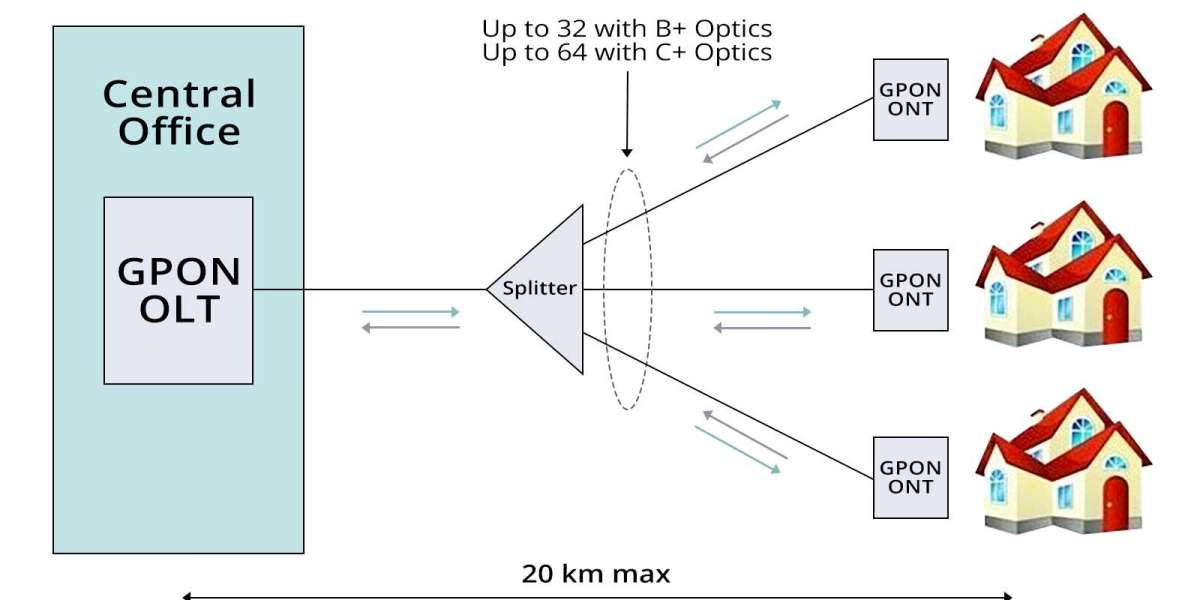The GPON Technology Market: A Comprehensive Overview
Market Overview
Gigabit Passive Optical Network (GPON) technology is a high-speed, fiber-optic network technology that delivers broadband services to end-users. Known for its efficiency, reliability, and high bandwidth capabilities, GPON technology is increasingly being adopted by telecom operators worldwide. This technology supports multiple services, including voice, video, and data, over a single fiber optic connection, making it a cost-effective solution for both service providers and consumers.
GPON Technology Market Size was valued at USD 6.6 Billion in 2022. The GPON technology market industry is projected to grow from USD 7.0092 Billion in 2023 to USD 11.341345 Billion by 2032. The market growth is driven by the rising demand for high-speed internet, increasing fiber-to-the-home (FTTH) deployments, and the need for scalable and efficient network solutions.
Request To Free Sample of This Strategic Report - https://www.marketresearchfuture.com/sample_request/12483
Key Market Segments
By Component
- Optical Line Terminal (OLT): The OLT is a crucial component in GPON technology, located at the service provider's central office. It manages the GPON network, transmitting signals to multiple Optical Network Terminals (ONTs).
- Optical Network Terminal (ONT): ONTs are customer-premises equipment that terminate the fiber optic line at the user's location, providing the interface for services like internet, TV, and phone.
- Optical Distribution Network (ODN): The ODN includes all the passive components between the OLT and ONTs, such as splitters and fibers, which are essential for signal distribution.
By Technology
- 2.5G PON: This technology supports downstream speeds of up to 2.5 Gbps and upstream speeds of 1.25 Gbps. It is widely deployed due to its balance of performance and cost.
- XG-PON (10G-PON): Offering downstream speeds of 10 Gbps and upstream speeds of 2.5 Gbps, XG-PON is designed for high-demand environments and future-proofing networks.
- NG-PON2 (Next-Generation PON2): NG-PON2 technology supports up to 40 Gbps downstream and 10 Gbps upstream, making it suitable for enterprise and high-capacity applications.
By Application
- FTTH (Fiber to the Home): GPON is predominantly used for FTTH deployments, providing high-speed internet and other services directly to residential customers.
- FTTB (Fiber to the Building): In multi-dwelling units, GPON technology connects buildings with fiber optic cables, distributing services to individual units via internal networks.
- FTTC (Fiber to the Curb): GPON connects fiber optics to a street-side cabinet, from which services are delivered to homes or businesses using copper cables.
- Enterprise Networks: Businesses use GPON for efficient, high-speed internal network solutions, supporting large volumes of data transmission.
Industry Latest News
Technological Advancements
Recent advancements in GPON technology focus on enhancing bandwidth capabilities and network efficiency. In 2023, several companies launched GPON solutions supporting XGS-PON, which provides symmetric 10 Gbps speeds. This upgrade caters to growing demands for high-speed internet and supports emerging applications like 5G backhaul and IoT.
Strategic Partnerships and Collaborations
The GPON market is witnessing numerous strategic partnerships aimed at expanding technological capabilities and market reach. For instance, in early 2024, a leading telecom operator partnered with a major GPON equipment manufacturer to roll out nationwide FTTH services, leveraging the latest XGS-PON technology.
Regulatory Developments
Regulatory frameworks are evolving to support the deployment of high-speed broadband networks. In 2023, the European Union introduced new guidelines to accelerate fiber optic infrastructure investments, aiming to achieve widespread gigabit connectivity by 2025. These regulations are expected to drive significant growth in the GPON market.
Huawei Technologies Co., Ltd.
Huawei is a dominant player in the GPON market, offering a comprehensive range of GPON solutions, including OLTs, ONTs, and ODN components. The company is known for its innovation and extensive product portfolio, catering to both residential and enterprise markets.
Nokia Corporation
Nokia provides advanced GPON solutions that support high-speed broadband services. Its GPON equipment is widely used by telecom operators globally, known for reliability and scalability. Nokia's Bell Labs division continues to drive innovation in GPON technology.
ZTE Corporation
ZTE is a key player in the GPON market, offering end-to-end GPON solutions. The company focuses on integrating advanced technologies like AI and IoT with GPON, enhancing network capabilities and user experience.
FiberHome Technologies Group
FiberHome is a leading provider of GPON equipment, known for its high-quality products and competitive pricing. The company's solutions are widely adopted in Asia and are expanding in other regions.
Calix, Inc.
Calix offers a range of GPON solutions tailored for service providers aiming to deliver high-speed broadband services. The company's focus on innovation and customer-centric solutions makes it a significant player in the market.
Market Drivers
Increasing Demand for High-Speed Internet
The growing need for high-speed internet is a primary driver of the GPON market. With the proliferation of bandwidth-intensive applications like video streaming, online gaming, and remote work, consumers and businesses alike demand faster and more reliable internet connections.
Expanding Fiber-to-the-Home (FTTH) Deployments
FTTH deployments are on the rise globally, driven by government initiatives and private sector investments. GPON technology, with its cost-effectiveness and scalability, is the preferred choice for these deployments, providing high-speed internet directly to homes.
Rising Adoption of 5G Networks
The rollout of 5G networks requires robust and high-capacity backhaul solutions. GPON technology supports 5G backhaul by providing the necessary bandwidth and reliability, driving its adoption in the telecom sector.
Need for Efficient Network Solutions
Telecom operators seek efficient network solutions to reduce operational costs and enhance service delivery. GPON technology, with its ability to support multiple services over a single fiber connection, offers significant cost savings and operational efficiencies.
Ask for Customization - https://www.marketresearchfuture.com/ask_for_customize/12483
Regional Insights
North America
North America is a leading market for GPON technology, driven by high internet penetration rates and significant investments in fiber optic infrastructure. The United States, in particular, is witnessing rapid FTTH deployments, supported by government initiatives to enhance broadband connectivity.
Europe
Europe is another significant market for GPON technology, with countries like the UK, Germany, and France leading in fiber optic deployments. The European Union's digital agenda and regulatory support are driving the adoption of GPON technology across the region.
Asia-Pacific
The Asia-Pacific region is experiencing rapid growth in the GPON market, driven by the increasing demand for high-speed internet and extensive government initiatives to develop broadband infrastructure. China, Japan, and South Korea are key markets, with extensive FTTH deployments underway.
Latin America
Latin America is gradually embracing GPON technology, with Brazil and Mexico being primary markets. The region's growing internet penetration and investments in broadband infrastructure are driving the adoption of GPON solutions.
Middle East and Africa
The Middle East and Africa are emerging markets for GPON technology, with increasing investments in fiber optic infrastructure. Countries like the UAE and South Africa are at the forefront of adopting GPON technology to enhance broadband connectivity and support digital transformation.
Conclusion
The GPON technology market is poised for significant growth, driven by the rising demand for high-speed internet, expanding FTTH deployments, and the need for efficient network solutions. Key players, strategic partnerships, and technological advancements are shaping the future of this dynamic market. As global demand for high-speed connectivity continues to grow, GPON technology will play a crucial role in delivering reliable and scalable broadband services across various regions and industries.
GPON Technology Market Highlights:


